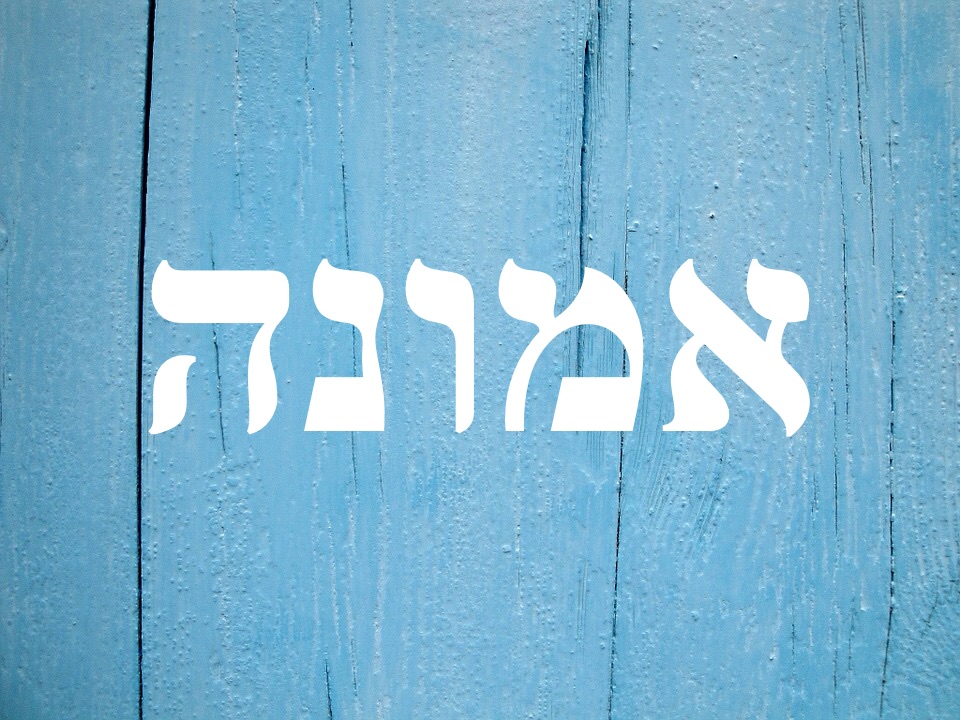
In Hebrew every word has a very simple root on which even the most complex words are based. By looking into these roots we can slowly unfold the underlying meaning of even more complex concepts.
Where English translations of the Bible usually have to choose one specific word over another, a Hebrew word can have many different meanings at the same time that all group around a core idea.
Nurture & Mercy
The Hebrew word for faith is Emunah (אמונה). We usually think of faith as something which is connected to (organized) religion and may have many preconceived notions about it, but when we look at the root it might turn out to be something far more primal to our existence.
The word Emunah is based on the word Em (אם – mother). Like a mother who is feeding, teaching and loving her child, Emunah is an almost subconscious influence in our life that nurtures us and gently guides us in our journey through this world.
Most of us turn towards this sense of faith only during hard moments, hanging our hopes on a higher power that will help us overcome a certain difficulty or crisis and then we immediately tend to forget it when everything is fine again.
Whether we are aware of it or not is irrelevant, however, since this sense of faith is always already there, like a fetus inside the womb is also not aware of the mother’s existence, and yet she constantly provides for all its needs.
The Hebrew word for womb is rechem (רחם) which shares the same letters with the word mercy (רחמים – rachamim), meaning that like a fetus grows in a mothers’s womb, we grow here in this world in a surrounding influence of mercy. In other words, there’s a hidden aspect of life which always supports and nurtures us, giving us exactly what we need at the right moment and in the right portion.
Although we may not always be in agreement with the general conditions of any given moment in time, the sense of faith is what aligns us with the intent of goodness behind these conditions.
It’s like when sometimes in life we desperately want something specific to happen which refuses to occur and only many years later we are grateful that things didn’t go our way, because we realize it wasn’t what we needed. This realization is an aspect of mercy.
Instead of going through constant cycles of desperation, frustration and waiting for the realization many years later, faith is a way to experience this completeness in each and every moment. Students of Hebrew will know that the word for “complete” (שלם – shalem) shares the same root with the word for “peace” (שלום – shalom), i.e. inner peace is a sense of completeness.
After all, as the old sages say, if already a human mother here in this world cares for a child and wants only the best for it, how much vaster is this caring and compassion in a spiritual sense?
Life Is Not Something To Be Managed
Another word that shares the same root with Emunah is of course “Amen” (אמן), the affirmation used to seal blessings and prayers in many languages around the world.
How is it that this particular Hebrew word, which strictly speaking can not be translated, is still adopted by millions of people from very different cultures?
An old commentary mentions that the word Amen is an abbreviation of the Hebrew phrase “El Melech Ne’eman” (אל מלך נאמן – towards a loyal king), meaning that all our thoughts, hopes and wishes shall be turned towards one source of goodness and mercy.
Whether we use the image of a king, or a mother, the idea here is the same: that our life is not something to be managed, to be “good at”, or to “be figured out”, but a journey towards gently coming into contact with this origin of love, hope and completeness.
–
